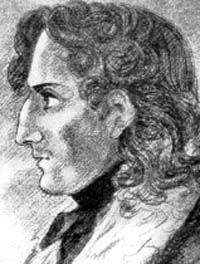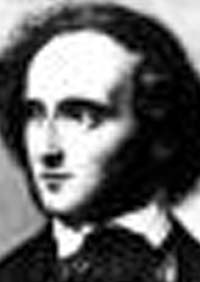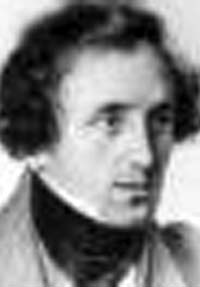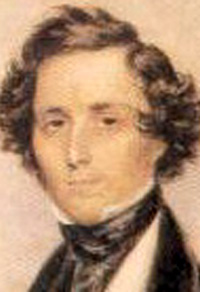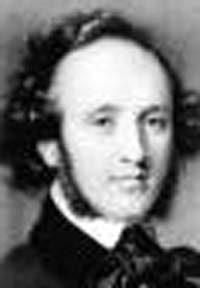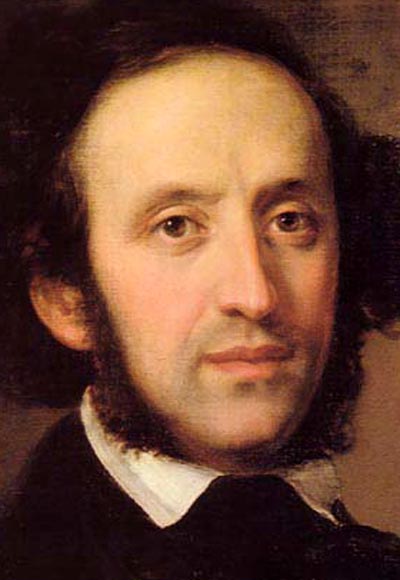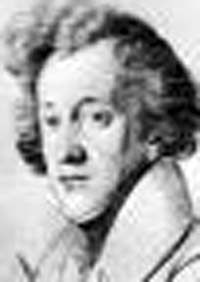Felix Mendelssohn
Copyright Michael D. Robbins 2005
Astro-Rayological Interpretation & Charts
Quotes
Biography
Images and Physiognomic Interpretation
Felix Mendelssohn-Bartholdy—Composer
February 3, 1809, Hamburg, Germany, approximately 8:00 PM. (Source: Speculative from Marc Penfield) Died, November 4, 1847, Leipzig, Germany.

(Speculative Ascendant, Virgo with speculative Moon also in Virgo; Sun and Mercury in Aquarius; Venus loosely conjunct Jupiter in Pisces with Pluto also in Pisces; Mars in Libra; Saturn conjunct Neptune in Sagittarius; Uranus in Scorpio)
Again we have an example of a powerful combination of universal, eclectic Aquarius blended with the fourth ray. Mendelssohn was one of the most gifted and accomplished composers of the 19th Century. He was a romantic with a definitely established understanding of classicism. This may be indicated by his Saturn (classicism) conjunction with Neptune (Romanticism). His music is delicate and pristine (speculative Virgo Ascendant and Moon). He also captures a certain gossamer, devic quality to which he was closely allied (one of the effects of ‘ariel’ Aquarius). Who better to write the incidental music to “A Midsummer Night’s Dream”?
Another side to his character is demonstrated by the sixth ray. He converted from Judaism to Christianity (as did a number of the better educated Jews of early 19th century Germany) and wrote, as a testimony to his new faith, the Reformation Symphony, featuring Martin Luther’s famous hymn, “A Mighty Fortress is our God”.As well, Mendelssohn wrote several of the most known and beloved religious oratorios—first and foremost, Elijah, and also St. Paul. His religious orientation was a deep theme in his life. Interestingly, he has the speculative Ascendant and six planets in signs which transmit the sixth ray of Idealism and Devotion.
Ever since I began to compose, I have remained true to my starting principle: not to write a page because no matter what public, or what pretty girl wanted it to be thus or thus; but to write solely as I myself thought best, and as it gave me pleasure.
People often complain that music is too ambiguous, that what they should think when they hear it is so unclear, whereas everyone understands words. With me, it is exactly the opposite, and not only with regard to an entire speech but also with individual words.
(Neptune in 3rd house in Sagittarius conjunct Saturn)The essence of the beautiful is unity in variety.
These seem to me so ambiguous, so vague, so easily misunderstood in comparison to genuine music, which fills the soul with a thousand things better than words.
Though everything else may appear shallow and repulsive, even the smallest task in music is so absorbing, and carries us so far away from town, country, earth, and all worldly things, that it is truly a blessed gift of God.
What a divine calling is music!
"By God, I play better here than in Berlin, and that is because the people listen better. Don't take that as a conceited comment, but it is exalting when you feel that you succeed and give others pleasure,"
Mendelssohn's letter to his family, June 1829 - telling that he was popular in London"Even if, in one or other of them, I had a particular word or words in mind, I would not tell anyone, because the same word means different things to different people. Only the songs say the same thing, arouse the same feeling, in everyone - a feeling that can't be expressed in words,"
Mendelssohn remarked on his Songs Without Words"I dislike nothing more than finding fault with a man's nature or talent; it only depresses and worries and does no good; one cannot add a cubit to one's stature, all striving and struggling are useless there, so one has to be silent about it, and let the responsibility rest with God." - Felix Mendelssohn
(Moon in Virgo conjunct Ascendant)"I know perfectly well that no musician can make his thoughts or his talents different to what Heaven has made them; but I also know that if Heaven had given him good ones, he must also be able to develop them properly." - Felix Mendelssohn
Few instances can be found in history of a man so amply gifted with every good quality of mind and heart; so carefully brought up amongst good influences; endowed with every circumstance that would make him happy; and so thoroughly fulfilling his mission. Never perhaps could any man be found in whose life there were so few things to conceal and to regret.
-- Sir George GroveIt is a proverb that names go by contraries. But proverbs are not always true. Mendelssohn’s Christian name was Felix, and what Berlioz said of Mendelssohn’s godson, Felix Moscheles, might truly be said of Mendelssohn himself: "So long as thou art Felix, that is, happy, thou shalt reckon on many friends." Mendelssohn stands as the type of the fortunate composer: "rich, talented, courted, petted, loved, even adored." His path was practically "roses, roses all the way." He never knew the cares that beset the lives of Beethoven, Mozart, Schubert, Wagner, and Schumann. The fires of adversity never touched him.
Whom the gods love die young, it is said. That distinction Mendelssohn also enjoyed, and it gives an additional glamour to his personality. He was one of the most blameless characters in the whole history of music. His aunt declared that during his whole career she failed to recall a word or deed that could be criticised. Lampadius, one of his biographers, emphasizes this. He says: "Living in loose capitals and surrounded by unprincipled people, he was true to all moral obligations, and perfect in all the relations of son, brother, lover, husband, and father. Surrounded by intriguers, he stood above them all, and was frank, transparent, honourable, noble; tempted by his sunny, enthusiastic, alert nature to do simply bright and genial things in music, he was thorough, studious, earnest, religious, and steadfastly consecrated to the highest and the best." Such was Felix Mendelssohn, the composer of Elijah, the man who conceived the "Songs without Words."
Mendelssohn’s father used to say: "Formerly I was the son of my father: now I am the father of my son." This meant that he was himself of no account, whereas his father and his son were famous. And that was true. For Mendelssohn’s grandfather was the once distinguished scholar and philosopher, Moses Mendelssohn. Moses was a Jew, and suffered all the disabilities which the Jew suffered at that time. He was small and hump-backed, too. And he was very poor; so poor that at one time his sole food was a weekly loaf, on which he carefully marked off his day’s allowance, in case he should be tempted to forestall tomorrow’s meal. But he had pluck and perseverance, and he rose to a high position. Here is a story of him. He had applied for the post of Court chaplain, and the Emperor told him that his success would depend upon the extempore sermon he should preach from a text given him when he was in the pulpit. At the critical moment Moses found that he had got a blank sheet of paper, but he did not lose his presence of mind, and very soon warmed up to an eloquent discourse on the creation of the world from nothing!
This, then, was the composer’s grandfather. His father, Abraham Mendelssohn, was a banker who had improved his already good position in Hamburg by marrying a lady of property. The first fruit of the union was a daughter named Fanny; the second was the future musician, Jakob Ludwig Felix, born at Hamburg on the 3rd of February 1809. Shortly after his birth, Hamburg fell into the hands of the French, and the family fled to Berlin, where the banking business was continued. By this date Abraham Mendelssohn had realised the practical inconveniences of being a Jew; so he decided to bring up his family as Protestant Christians. At the same time he added the name of his wife’s family, Bartholdy, to his own, desiring to be known by that rather than by so obviously Jewish a name as Mendelssohn. He tried to get his son to call himself Felix M. Bartholdy, that is, to drop the Mendelssohn altogether. The son declined, but he compromised by writing the full name, Felix Mendelssohn-Bartholdy. To-day no one thinks of using the double-barrelled name. Mendelssohn does not belong to Judaism, but to the world.
Felix and Fanny, most loving of brothers and sisters, were both musical. They remind one of Mozart and his sister. The mother was their first instructor, and it is delightful to read of her sitting beside them while they practised, and wondering at what she called their "Bach-fugue fingers." Fanny at first showed gifts equal to her brother, and Meldelssohn used to say that she played better than himself. But, like most girls, she "went and got married," and music lost what might have been a modestly rich inheritance. When the mother’s teaching limits were reached, a couple of masters were called in, one for piano, another for theory. The theory master was Zelter, who had been a pupil of Bach. But so far, Mendelssohn, like his sister, was simply taking music as one of the adjuncts of a liberal education. There was as yet no idea of his making a profession of it. Abraham Mendelssohn only wanted to clothe his children with the essentials of general culture, and music had to be included.
In course of time, however, the boy declared emphatically for music as a profession. The father hesitated, though he had really been encouraging Felix all along, especially with music-makings in the home, when the boy would conduct the improvised orchestra. He would not rely on his own judgment, anyway. He would take the boy to Paris, and consult Cherubini about him. This was in 1825. "The lad is rich," said Cherubini; "he will do well in music. I myself will talk to him, and then he will do well." The "and then" is delectable, and just expresses the character of Cherubini, whom Mendelssohn compared with an extinct volcano covered with ashes and occasionally belching forth flames. However, it settled the matter for Mendelssohn. Very soon the stream of composition was running freely, and the young artist was working away at the profession of his life. The first really notable work that came from his pen was the overture to the Midsummer Night’s Dream, written when he was only seventeen. For neatness of expression, freshness of invention, management of form, and delicacy and finish of orchestration, Mendelssohn never surpassed this early work. It took him the best part of a year to write it, but surely it was a year well spent.
His life went on somewhat uneventfully for years after this; and when 1829 came his parents sent him off to England on the beginning of a "grand tour," which was to extend through most of the countries of Europe. Landing in London, he had his Midsummer Night’s Dream overture performed, and the effect was electrical. All at once, and when least expected, the great gap left by the death of Beethoven seemed likely to be filled up. The story is told that after the performance the full score of the overture was left in a cab and entirely disappeared; but Mendelssohn wrote it all out again from memory, and it was found to be almost perfectly exact when compared with the separate orchestral parts.
Mendelssohn had a great affection for London. He called it "the grandest and the most complicated monster on the face of the earth." He came to it again and again, and was never tired of praising the "smoky nest." Amid the glories of a Naples spring he could write that "My heart swells when I even think of London.’ On this first visit he lodged with a Mr. Heinke, a German ironmonger, at 103 (now 79) Great Portland Street. Mrs. Heinke made capital bread-and-butter puddings, and Mendelssohn was so found of them that he asked her to keep a reserve in the cupboard of his sitting-room, so that he might help himself when he came in late at night. The cup supporting a pie-crust was a novelty to him, and he was always much amused when it was lifted and the juice bubbled out. He had the simple enjoyments of an overgrown boy. An incident of this same visit may be told in his own words. He says: "The other day we three walked home from a highly diplomatic party, having had our fill of fashionable dishes, sayings, and doings. We passed a very enticing sausage shop, in which ‘German Sausages, two pence each,’ were laid out for show. Patriotism overcame us; each bought a long sausage. We turned into where it was quieter, Portland Street, and there consumed our purchases, Rosen and I being hardly able, for laughing, to join in the three-part songs of which Mühlenfelds would sing the bass." Mendelssohn had a rich appreciation of a joke. One English story vastly amused him. It was this: At a country funeral the parish clerk, or sexton, appeared in a red waistcoast. When the clergyman remonstrated with him upon the unseemly colour, the clerk replied: "Well, what does it matter, your reverence, so long as the heart is black?"
Mendelssohn had two grand pianos in his rooms at the Heinke’s, and he was constantly practising. Moreover, he practised on a dumb keyboard while sitting up in bed. His public appearances were greeted with wild enthusiasm. The best account of them is in his own letters, for he was a charming letter-writer. "Old John Cramer led me to the piano like a young lady," he says, "and I was received with immense applause." At a morning concert he played Weber’s Concertstück, when he was dressed in "very long white trousers, brown silk waistcoat, black necktie, and blue dress coat." Of another concert he tells, with consummate amusement, how a lady accidentally sat on a kettledrum.
The season closed, and at the end of July he set off for Edinburgh. He wanted to see Scotland, he said, because of the Waverley Novels, all of which he had read. For companion he took with him his friend Carl Klingemann, then secretary to the Hanoverian Embassy in London. He was enraptured with Edinburgh, and the Highland soldiers marching from the church to the Castle specially took his attention. He even got a Scots piper to play to him at his hotel. He was in a mood to be pleased with everything and everybody. "How kind the people are in Edinburgh, and how generous is the good God!" he wrote home. "The Scotch ladies," he naively observes, "deserve notice." The last evening of the visit was devoted to Holyrood, "where Queen Mary lived and loved." The chapel, he writes, "is now roofless; grass and ivy grow there"; and he adds: "I believe I found to-day, in that old chapel, the beginning of my Scotch Symphony." The Scotch Symphony was indeed a direct result of this visit, as was also the Hebrides overture.
For Mendelssohn was not satisfied with seeing Edinburgh. By way of Stirling and Perth, he and Klingemann proceeded to the Highlands, with Highland weather accompanying them till they reached Glasgow. Earth and sky, in Mendelssohn’s phrase, were "wet through." At Bridge of Tummel they were housed in an inn where they had "Scotch wooden shoes" for slippers, "tea with honey and potato cakes," and -- whisky. The little boys, "with their kilts and bare knees and gay-coloured bonnets, the waiter in his tartan, old people with pigtails, all talk helter-skelter in their unintelligible Gaelic." No wonder the travelers thought they had "stumbled on a bit of culture" when they struck Fort-William! Later on, at Tobermory, they found everything "perfectly charming." Klingemann had somehow confounded the Hebrides with the Hesperides, and was disappointed (so he says) to find the oranges in the toddy instead of on the trees! But both Germans were getting used to "good Scots drink." A visit to Staffa and Iona proved that they were not getting used to Atlantic weather. Mendelssohn was a bad sailor, and was most unromantically sea-sick. To make matters worse, it rained all the time, until he exclaimed in despair that the Highlands speared to brew nothing but whisky and bad weather. It was a constant matter of dispute between him and Klingemann whether the wet should be called rain or mist. There were no beds on the boat, and the passengers lay about like herrings. Klingemann tells that when half asleep he tried to drive away the flies from his face and found that he was tearing at the grizzly locks of an old Highlander. Discomforts of various kinds attended them till they got to Glasgow, but in spite of it all, Mendelssohn hugely enjoyed himself. In one of his Glasgow letters he says: "It is no wonder that the Highlands have been called melancholy. But two fellows have wandered merrily about them, laughed at every opportunity, rhymed and sketched together, growled at one another and at the world when they happened to be vexed or did not find anything to eat; devoured everything eatable when they did find it, and slept twelve hours every night. These two were we, who will not forget it as long as we live." Nor has the musical world forgotten it, for if it had not been for that tour of 1829, we should not, as already indicated, have had the Scotch Symphony and the Hebrides overture.
The Scottish tour was almost immediately followed by a tour in Italy. There were other wanderings, including a visit to Paris, where, to use his to own expression, Mendelssohn "cast himself thoroughly into the vortex." He was never in love with Paris and its musical ways, any more than Mozart. Parisians, he complained, were ignorant of Beethoven, and "believed Bach to be a mere old-fashioned wig stuffed with learning." When he met Chopin in 1834 his criticism was that Chopin "laboured a little under the Parisian love for effect and strong contrasts, and often lost sight of time, and calmness, and real musical feeling." It was, however, in Paris that Chopin, Berlioz, Hiller, and Mendelssohn, all of similar age, might have been seen arm-in-arm, promenading, and enjoying life to the full.
This period of Mendelssohn’s career produced the Walpurgis Night, the great Symphony in A major, the Melusine overture, and the first of those famous "Songs without Words" which have been the companions of all lovers of classical piano music since they were first published. Piano music, when Mendelssohn began writing them, was mostly given over to mechanical dexterity. Musical claptraps, skips from one end of the keyboard to the other, endless shakes and arpeggios-that was the kind of thing in vogue. Mendelssohn’s aim in these Lieder ohne Wörte was to restore the illtreated piano to its dignity and rank; and with what success he carried out his purpose, every pianist knows. The name, Lieder ohne Worte, was Mendelssohn’s own. The English equivalent was not settled without difficulty. The first book was published in 1832, with the title of Original Melodies for the Pianoforte. It is astonishing to recall the fact this first book took four years to reach a sale of 114 copies. It was Moscheles who found a publisher for it, and, foreseeing its value, arranged for a royalty for the composer. Mendelssohn, a year later, feared that his share would not amount to sixpence, but the publisher’s books a few weeks after this time show that he received £4:16s. as royalty on forty-eight copies sold.
In 1833 Mendelssohn was appointed "Municipal Music Director" at Düsseldorf, and it was there that he began his oratorio St. Paul, a work which has been quite eclipsed in popularity by the companion Elijah. The Düsseldorf engagement formed really the starting-point in his professional career. Hitherto home influences had prevailed; now he was to be dependent on himself. Unfortunately he did not find the Düsseldorf duties agreeable. He complained that by four in the afternoon half the town was drunk, so that he had to do all his business in the morning. And the band was far from being to his mind. "I assure you," he wrote to Hiller, "that, at the beat, they all come in separately, not one with any decision, and in the piano the flute is always too loud; and not a single Düsseldorf can play a triplet clearly, but all play a quaver and two semiquavers, and every allegro leaves off twice as fast as it began, and they carry their fiddles under their coats when it rains, and when it is fine they don’t cover them at all. If you once heard me conduct this orchestra, not even four horses could bring you there a second time." This takes a very humorous view of the situation, but Mendelssohn found it anything but humorous; and it was a great relief to him when he was appointed conductor of the famous Gewandhaus concerts at Leipzig. Here the conditions were entirely congenial, and he went on with his work in the best of spirits, the musical idol of town.
Still, there was something wanting to complete his happiness. He wanted a wife. In 1836 he went to Frankfort on a professional engagement, and an engagement of another kind soon followed. It was by the merest chance that he met Cécile Jeanrenaud, who was the daughter of a clergyman of the French Reformed Church; and the fact that he had fallen in love at first sight suggested caution to his prudent mind. He would test his feelings by going away for a month. If he were then still in love, he would propose. The result of the test we can gather from the following letter of September 1836, addressed to his mother: "I have only this moment returned to my home, but I can settle to nothing till I have written to tell you that I have just been accepted by Cécile. My head is quite giddy; it is already late at night, and I have nothing else to say; but I must write to you, I feel so rich and happy. To-morrow I will, if I can, write a long letter, and so, if possible, will my dear betrothed."
Mendelssohn nearly lost his head with blissful excitement. The marriage took place in March 1837, and during the honeymoon Mendelssohn expressed himself as more ecstatic than ever. As bad luck would have it, he had to tear himself away from his wife and start for England to conduct his St. Paul at the Birmingham Festival. And this is how he growls, writing to Hiller from London: "Here I sit in the fog, very cross, without my wife, writing you because your letter of the day before yesterday requires it, otherwise I should hardly do so, for I am much too cross and melancholy to-day. I must be a little fond of my wife, because I find that England and the fog, and beef and porter, have such a horribly bitter taste this time, and I used to like them so much."
Mendelssohn’s married life was supremely happy. His beautiful, gentle, sensible wife spread a charm over the whole household, which enabled him to throw off such professional outside worries as beset him during his short, strenuous career. Everybody who met her praised Frau Mendelssohn. When Moscheles paid his first visit to the pair, he wrote: "Mendelssohn’s wife is very charming, very unassuming and child-like, but not in my judgment a perfect beauty, because she is a blonde." So many men, so many ideas of female beauty! The Leipzig home looked out upon the St. Thomas school and church, once the scene of Bach’s labours. This was probably no accident, for Mendelssohn’s reverence for Bach was profound. He revived the Matthew Passion at Berlin when he was only twenty. During his visits to London, he was constantly preaching, playing, or talking about Bach. His performances of the organ preludes and fugues at various London churches, and at the Birmingham Festival, aroused great interest. It was he, too, who was chiefly instrumental in raising the Leipzig monument to the memory of Bach. Mendelssohn, in fact, "restored Bach to a world that had forgotten him for a hundred years," and this service alone was an immortality.
Leipzig remained Mendelssohn’s home until 1841, when, at the instance of the recently-crowned Frederick William IV., he went to Berlin as prospective musical director of an Academy of Arts. Prospective, for the thing was still in the air; where, so far as Mendelssohn was concerned, it remained. He had never liked Berlin; and as the Academy arrangements were still in a taste of chaos, he returned to Leipzig after a year’s waiting. About this time the King bestowed on him the Order of Merit, a distinction which he valued very highly. One day he was walking with some friends across the bridge at Offenbach. One of them stayed behind to pay toll for the rest. "Is not that the Mr. Mendelssohn whose music we sing at our Society?" asked the toll keeper. "It is." "Then, if you please, I will pay the toll for him myself." When Mendelssohn was informed of the incident, he said: "H’m! I like that much better than the King’s Order." The composer made one more attempt to create a home in Berlin, when, by the death of his father and mother, the old family house became his property. But again he found it would not work. "The first step out of Berlin is the first step towards happiness," he wrote, after trying it for a reasonable time. The prophet was without honour where his youth had been spent.
Shortly after his return to Leipzig -- the date was April 1843 -- Mendelssohn was able to realise his long-cherished project of founding a Conversatorium for the town. He did not live to see the full results of his inception, but the fame of the Leipzig Conservatorium has long been known to musical Europe and to America as well. Mendelssohn had plenty to do at the institution, for he was its virtual head, as well as one of the professors. Yet, all the time he was going on with his compositions -- with the Lobgesang, and the Festgesang, from which is derived the tune for "Hark! The herald angels sing"; with the music for the Midsummer Night’s Dream, with its ever-popular "Wedding March"; with Athalie and its famous "War March of the Priests," and with many other things besides. At the date we have reached, the great oratorio of Elijah was approaching completion. It was written specially for the Birmingham Musical Festival, where the composer conducted the first performance in August 1846. How it was received we learn from Mendelssohn himself. "No work of mine," he wrote to his brother, "ever went to admirably the first time, or was received with such enthusiasm by both the musicians and the audience." When the Festival was over he returned to London, "on purpose for a fish dinner at Lovegrove’s"; spent a few days at Ramsgate "to eat crabs," and was back in Leipzig about the middle of September.
Elijah was Mendelssohn’s last work: it killed him, just as the Creation killed Haydn. He had overworked his never too robust frame, and in his exhausted state the death of his beloved sister Fanny came to add to his prostration. He conducted a few of the Leipzig concerts, but his doctor forbade him to play any more in public. He fell into a profound melancholy, roaming about the fields for hours alone, or writing letters to friends bewailing his lot. Everybody saw how it must end. One evening, while accompanying a lady at the piano, he became insensible, and was carried home to his family. A cerebral attack followed, and on the 4th of November 1847 he breathed his last, in the presence of his disconsolate wife and children (five had been born to him) and a few cherished friends. Thus was another great musician cut off in the meridian of life.
Mendelssohn was one of the most lovable of men, gentle as his music, pure as the mountain stream. He had nothing Bohemian about him. Weaknesses he had, no doubt, but they were lovable too. He had little coaxing ways with his friends, which made them love him with something of a child’s love. When in company with Edward Devrient, he would sometimes pronounce his name with an affectionate and lingering drawl, "Ed-e-ward," apropos of nothing in particular. He retained through life something of the impulsiveness and the simplicity of a child. He had a passion for cake and sweetmeats. Next to his own countrymen, he loved the English. Her Majesty the late Queen Victoria and Prince Albert were among his warmest admirers; and the story is told of how the Queen once sang some songs to his accompaniment at Buckingham Palace. She was not satisfied with her performance, and said to Mendelssohn: "I can do better -- ask Lablache (her singing master) if I can’t. But I am afraid of you." She asked Mendelssohn how she was to thank him for accompanying her. He said he would like to see her sleeping children, and when this was granted, he kissed them, thinking, we may be sure, of his own children at home.
In person Mendelssohn was small, but was counted handsome. His look is described as "dark and very Jewish." He had strikingly large dark-brown eyes, which became extraordinarily bright and expressive when he was animated. He was perhaps the most versatile of all the composers, for he was an adept at painting, billiards, chess, riding, swimming, and general athletics.
Schumann called Mendelssohn the Mozart of the nineteenth century. "I look upon Mendelssohn," he said, "as the first musician of his time, and pay him the homage due to a master." The musical world is not so enthusiastic about Mendelssohn now. The pendulum has swung to the other side: he was praised too much in his lifetime, and now he is praised too little. It has become the fashion to decry his music as lacking in depth. That is not surprising in an age which puts Wagner above Beethoven and prefers the pessimism of Tschaikowsky to the optimistic clarity of Haydn and Mozart. A modern young lady said she never played Mendelssohn "because there were no wrong notes"! But there are still some who do not like their composers to be eternally rushing through the thorn bush of dissonance, and to such Mendelssohn is ever welcome. As Sir George Grove said, there is surely enough of conflict and violence in life and in art without demanding more of it from Mendelssohn. When we want to be made unhappy by music, we can turn to others. In Mendelssohn we shall find nothing that it not at once manly and refined, clever and pure, brilliant and solid.


